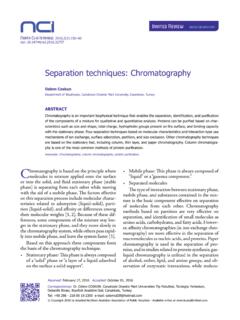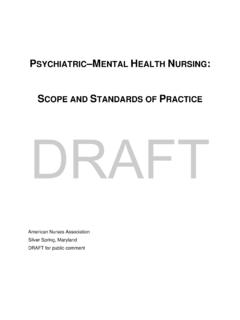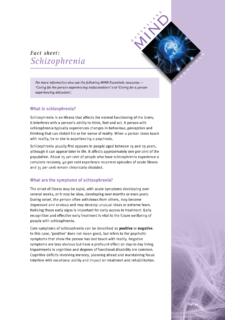Transcription of The Use of Theories in Psychiatric Nursing-II
1 The Use of Theories in Psychiatric Nursing-II1 Student in Nursing, Ko University health Sciences Faculty, stanbul2 Department of Psychiatric Nursing, Ko University College ofNursing, stanbulCorrespondence ( leti im): Tu ba PEHL VAN. e-mail (e-posta): Hem ireli i Dergisi 2016;7(2):100-104 Journal of Psychiatric Nursing 2016;7(2):100-104 Doi: (Geli tarihi): Accepted (Kabul tarihi): Psikiyatri Hem ireli inde Kullan m -IITu ba PEHL VAN,1 Perihan G NER2 SUMMARYThe use of theory in the mental health field can be traced back before the 19th century. Later, with the detection of biological causes for the formation of mental health problems, psychosocial Theories and biologi-cal approaches began to be used together. Accordingly, some authors tried to define the theoretical framework of Psychiatric nursing, and it has been said that the biological and psychosocial Theories used in the mental health field can also be used in the field of Psychiatric nursing.
2 This article discusses how Psychiatric nurses can use the Theories that constitute the framework of Psychiatric nursing, and it explores this con-cept through the perspectives of the Theories : Psychiatric nursing; Psychiatric nursing practice; theory; theoretical framework. ZETRuh sa l alan nda teorilerin kullan m 1800 l y llar n ncesine dayan-maktad r. Daha sonra ruhsal sorunlar n olu umunda biyolojik nedenlerin saptanmas ile birlikte psikososyal teoriler ve biyolojik yakla mlar birlikte kullan lmaya ba lanm t r. Bu do rultuda baz yazarlar taraf ndan psiki-yatri hem ireli inin kuramsal er evesi tan mlanmaya al lm t r ve ruh sa l alan nda kullan lan biyolojik ve psikososyal teorilerin psikiyatri hem- ireli i alan nda da kullan labilece i ifade edilmi tir.
3 Bu makalede, kuramsal er eveleri olu turan yazarlar n bak a s ndan, psikiyatri hem ireli inin kuramsal er evesini olu turan teorilerin psikiyatri hem ireli i alan nda na-s l kullan labilece i tart lm t s zc kler: Psikiyatri hem ireli i; psikiyatri hem ireli i uygulamas ; teoriler; teorik er and models in the field of psychiatry are used by mental health professionals to determine the basis of behav-iors and to plan necessary initiatives.[1] However, it should be noted that many of these Theories are still under devel-opment and have been supported by a limited number of studies. However, it is stated that the inadequate number of studies does not imply that these Theories are useless. There-fore, it is essential for researchers and clinicians to note that information and experiments relating to present Theories are limited.
4 [2] Videbeck (2013) also states that since many psy-chosocial Theories are developed based on theoreticians per-sonal experiences rather than on research, it is appropriate for them to be called models instead of Theories . Therefore, some authors observed in the literature prefer to use the word model rather than theory. [3]The emergence, development, and spread of psychosocial models/ Theories dates back to before the 19th century. These Theories revealed potential explanations for the ways in which people think, feel, and behave, and models related to develop- mental processes. In the past, theoreticians used various forms of speech therapy or psychotherapy. They were interested in the complex structure of the mind and emphasized the effect of environmental factors on its development.
5 Today, at the be-ginning of the 21st century, it is a generally accepted belief that mental health and mental disorder is a process that emerges through the effect of psychosocial and biological factors, and it is generally accepted that there is a dynamic interaction be-tween them.[4] Many authors trying to define the theoretical framework of Psychiatric nursing also choose biological and psychosocial Theories when defining their framework.[5]Some authors have tried to construct the theoretical framework of Psychiatric nursing based on Theories used in the mental health field, while others have identified nurs-ing models or Theories as being at the base of the theoretical framework for Psychiatric nursing.[1 3,6 14] While construct-ing the theoretical framework for Psychiatric nursing, each author attempted to explain why she or he chose these theo-ries, and also tried to identify the relationship of each theory to nursing practices.
6 [5] Authors associated the Theories that they identified while constructing a theoretical framework of Psychiatric nursing with Psychiatric nursing practices as explained Can Theories Be Used in Psychiatric Nursing Practices?Psychoanalytic Theory Psychoanalytic theory is based on the philosophies of 100 REVIEW / DERLEMEF reud and Jung. It argues that mental disorder occurs be-cause of unconscious powers in the human mind. It is based on unconscious behaviors and dynamic interaction between the id, the ego and the superego. In this theory, the aims of treatment are (1) to increase the individual s awareness about the underlying causes of his or her behaviors and (2) to en-able identification of conflicts.[6,8] Boyd (2002) states that Freud s theory is associated with Psychiatric nursing prac-tices in many aspects and that Psychiatric nurses use many concepts of psychoanalytic Theories in their practice, such as interpersonal relations, defense mechanisms, transference, countertransference, empathy, levels of consciousness, and in-ternal objects.
7 [2] Moreover, it is also stated that relationships between therapeutic individuals is a fundamental element of Psychiatric nursing and that Psychiatric nurses can ana-lyze and solve patients mental health problems through the strong relationships between therapeutic individuals.[2] Boyd (2002) also states that empathy is another concept adopted from psychoanalytic Theories that is used in Psychiatric nurs-ing practices. The concept of empathy is quite important for all areas of nursing and is studied by many nursing experts.[2] Shives (2008) states that Freud s theory influences the de-velopment of Psychiatric nursing Theories , and accordingly the nurses adopt non-adaptive defense mechanisms in their professional practices.[9] In contrast, Kneisl and Trigoboff (2013) state that psychoanalytic theory provides nurses with quite a limited treatment role.
8 [10] They also report that nurses gained interest in this theory following the establishment of treatment areas, such as interview rooms in private hospitals, based on psychoanalytic theory. However, the nurses who are not knowledgeable about the psychoanalytic theory, cannot play psychotherapeutic roles, and they can only use the con-cepts and language of psychoanalytic theory.[10]Developmental TheoriesBasavanthappa (2011) and Shives (2008) report that de-velopmental Theories focus on duties particular to a develop- mental stage, successful departure from the stage, cognitive maturation, and moral maturation, and these Theories estab-lish guidelines for expected development during the life span.[6,9] Shives (2008) states that nurses realized that human de-velopment begins with insemination and continues through-out the life until death, thanks to the developmental Theories .
9 [9] Crowe et al. (2008) state that according to psychoanalytic theory, difficulties experienced by an adult result from his or her childhood, and nurses can help the individual learn new ways to solve problems by helping him or her to realize that coping mechanisms that served a purpose during childhood are ineffective in adulthood.[11] Similarly, based on Freud s psychosexual development theory, Halter (2013) states that childhood experiences have a profound effect on an indi-vidual s personality formation, and a nurse can research and identify the main causes of a patient s suffering using this in-formation.[12] Halter (2013) also states that Erikson s devel-opmental model is a fundamental element of patient evalua-tion, and a developmental framework helps nurses recognize which initiatives are the most effective.
10 [12] For example, in the initiative versus guilt stage of Erikson s developmen-tal theory, it is stated that children give the best response if they actively participate and ask questions. A nurse can in-form family members about how they should approach to the child in that period using this information.[12] Basavanthappa (2011) notes that Erikson s theory also provides an opportu-nity for the interpretation of sensitive stages of development.[6] For example, it is stated that a nurse can help a patient who is paralyzed and feels hopeless and depressed because of not being able to provide care for his or her house by exploring his or her existing power and skills (raising children, tutoring young people et cetera.).[6] Boyd (2002) states that develop- mental Theories are particularly helpful for nurses who work with children to determine their state of development and mood; however, the use of these models is limited because they have not been adequately tested.






